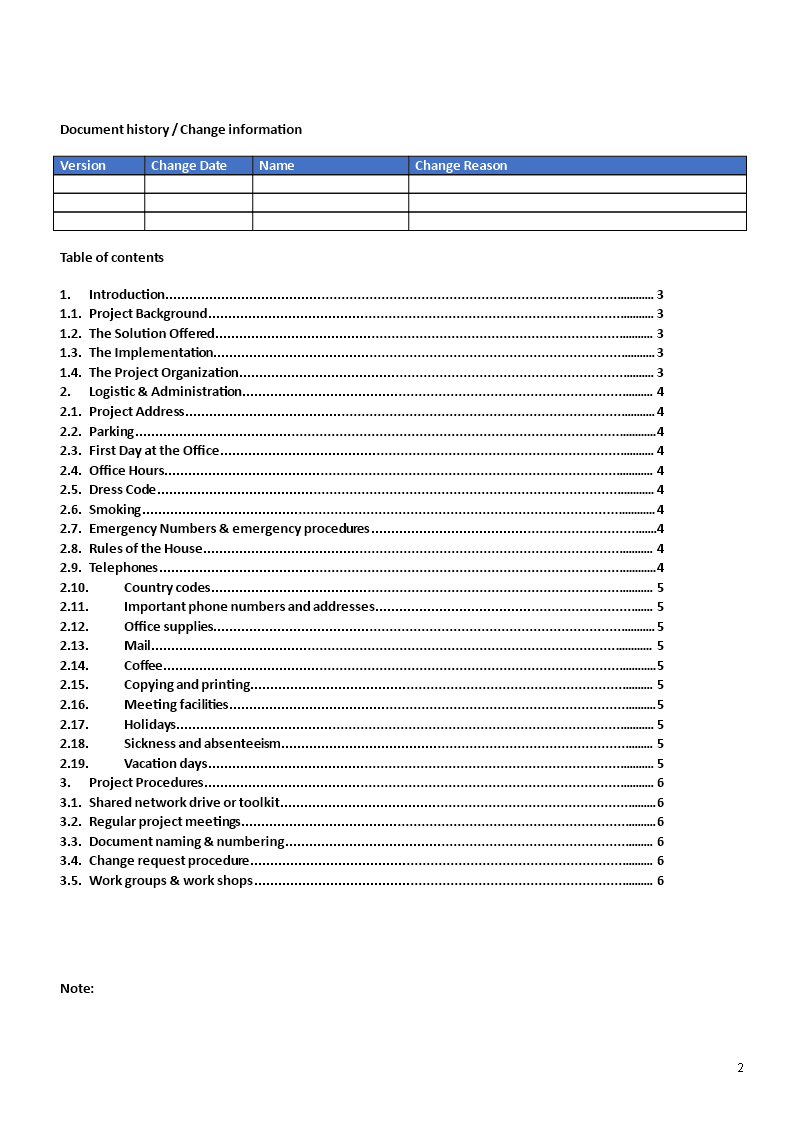Project Management Handbook
Save, fill-In The Blanks, Print, Done!

Download Project Management Handbook
Today: USD 5.99
Download It Now

Available premium file formats:
Microsoft Word (.docx)- This Document Has Been Certified by a Professional
- 100% customizable
- This is a digital download (32.93 kB)
- Language: English
- You will receive a link to download the file as soon as your payment goes through.
- We recommend downloading this file onto your computer.
How do you develop a Project Management Handbook? Download this Project Management Handbook template now!
When you start a project, one of the first actions will be to write a Project Handbook by the Project Manager or the Project team. Such a handbook documents the approach for implementing the project goals. It also highlights the key controlling processes to be used, the project policies and rules, and the overall management approach and will be read and accepted by the board before starting the project.
Adequate communication is essential in order to finish projects successfully. In order to gain truthful and accurate information, you need to make sure that program or project managers are able to make rational and correct decisions. For those who have what we call a "high-performance mindset,” we know they prefer to work with the latest update of professional project management templates, in order to achieve their goals faster. We are certain this project template will be of value.
Feel free to download this Project Management Handbook, or simply browse through our website to find other basic or advanced template designs. They are intuitive and available in several kinds of formats, such as PDF, WORD, XLS (EXCEL including formulas and can calculate sums automatically).
Project Management
Projects can be of various types, which means they have to be managed differently. Based on the type of industry and business niche, every project needs to be understood and analyzed before jumping on to the actual phase of project management.
After the initial phase of planning and obtaining sufficient knowledge about the project, project managers can outline the strategies for successful management and implementation of a project. In this phase, the planned tasks are completed within the decided time frame, one after another. This phase has to be managed expertly to ensure that all the important tasks are completed timely.
The phase of project management can be categorized into different stages. The most important stages of project management are given below:
- Initial Planning;
- Execution of Plans;
- Monitoring and Tracking the Progress;
- Closing;
- Evaluation.
Project Management Handbook structure:
- Table of contents ,
- Introduction ,
- Project Background ,
- The Solution Offered ,
- The Implementation ,
- The Project Organization ,
- Logistic & Administration ,
- Project Address ,
- Parking ,
- First Day at the Office ,
- Office Hours ,
- Dress Code ,
- Smoking ,
- Emergency Numbers & emergency procedures ,
- Rules of the House ,
- Telephones ,
- Country codes ,
- Important phone numbers and addresses ,
- Office supplies ,
- Mail ,
- Coffee ,
- Copying and printing ,
- Meeting facilities ,
- Holidays ,
- Sickness and absenteeism ,
- Vacation days ,
- Project Procedures ,
- Shared network drive or toolkit ,
- Regular project meetings ,
- Document naming & numbering ,
- Change request procedure ,
- Work groups & work shops.
Using this project management handbook template guarantees that you will save time, cost, and effort and make you more successful in your project, work, and business! Download this project handbook template now!
DISCLAIMER
Nothing on this site shall be considered legal advice and no attorney-client relationship is established.
Leave a Reply. If you have any questions or remarks, feel free to post them below.
Related templates
Latest templates
Latest topics
- Hourly Weekly Schedule Template
How do I make an hourly schedule? Streamline your daily planning with our versatile hourly daily weekly schedule templates - Excel Templates
Where do I find templates for Excel? How do I create a template in Excel? Check these editable and printable Excel Templates and download them directly! - GDPR Compliance Templates
What do you need to become GDPR compliant? Are you looking for useful GDPR document templates to make you compliant? All these compliance documents will be available to download instantly... - Daily Report Sheets For Preschool
How do you create a kindergarten schedule or write a daily report for a preschool? Check out these preschool templates here. - Celcius To Farenheit Chart
How to Download our temperature Celsius to Fahrenheit conversion charts and streamline your temperature calculations and conversions here.
cheese
